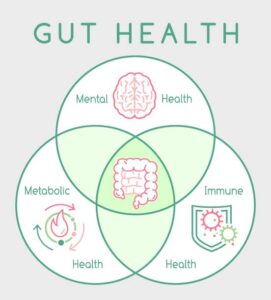
In recent years, the importance of gut health has taken center stage in the world of wellness and healthcare. The human gut, often referred to as the “second brain,” plays a crucial role in maintaining overall well-being. From digestion and nutrient absorption to immune function and mental health, the gut’s impact on our bodies is profound. In this comprehensive guide, we’ll delve into the intricate world of gut health, exploring its components, the microbiome, and practical ways to promote a healthy gut for a thriving life.
Roles of the Gut Microbiome:
Understanding the Microbiome:
1.1 The Gut Microbiota: A Diverse Community
At the core of gut health lies the microbiota, a diverse collection of trillions of microorganisms residing in the gastrointestinal tract. Comprising bacteria, viruses, fungi, and other microbes, this community forms a symbiotic relationship with the human body, influencing various physiological processes.
1.2 The Gut-Brain Axis: Communication Between Two Worlds
The gut and the brain are interconnected through a bidirectional communication system known as the gut-brain axis. This intricate network allows the microbiome to impact cognitive function, mood, and even behavior. Understanding this dynamic relationship is crucial for appreciating the holistic nature of health.

Importance of Gut Health:
2.1 Digestive Function and Nutrient Absorption
A well-balanced microbiome is essential for proper digestion and nutrient absorption. The microorganisms in the gut aid in breaking down complex carbohydrates, producing essential nutrients, and ensuring efficient absorption in the intestines. Disruptions in this process can lead to malnutrition and various digestive disorders.
2.2 Immune System Support
Approximately 70% of the immune system resides in the gut-associated lymphoid tissue. The microbiome plays a vital role in training and regulating the immune system, helping it distinguish between harmful pathogens and beneficial microorganisms. A robust gut microbiome contributes to a resilient immune response.
2.3 Mental Health and Cognitive Function
Emerging research suggests a strong connection between gut health and mental well-being. The gut-brain axis facilitates communication between the enteric nervous system and the central nervous system, influencing mood, stress response, and cognitive function. A healthy microbiome may contribute to better mental health outcomes.
-
Digestion and Nutrient Absorption:
- Beneficial bacteria aid in breaking down complex carbohydrates, proteins, and fats, facilitating nutrient absorption in the small intestine.
- Short-chain fatty acids produced by gut bacteria contribute to energy production and metabolic health.
-
Immune System Support:
- The gut is a crucial player in the immune system, with about 70% of the body’s immune cells residing in the gut-associated lymphoid tissue (GALT).
- A balanced microbiome helps regulate immune responses, preventing inflammation and promoting immune tolerance.
-
Mental Health Connection:
- The gut-brain axis is a bidirectional communication system between the gut and the central nervous system.
- Gut bacteria produce neurotransmitters such as serotonin, impacting mood, stress, and mental well-being.
Factors Influencing Gut Health:
3.1 Diet: The Foundation of Gut Health
The food we consume significantly impacts the composition and diversity of the gut microbiome. A diet rich in fiber, prebiotics, and probiotics promotes the growth of beneficial bacteria, fostering a balanced microbiota. On the contrary, diets high in processed foods and sugars can disrupt this balance, leading to an imbalance in microbial populations.
3.2 Antibiotics and Medications
While antibiotics are crucial for treating bacterial infections, they can also indiscriminately target beneficial bacteria in the gut. Prolonged or frequent antibiotic use may disrupt the microbiome, emphasizing the need for judicious antibiotic usage. Certain medications, such as proton pump inhibitors and nonsteroidal anti-inflammatory drugs, can also impact gut health.
3.3 Lifestyle Factors
Factors like stress, lack of sleep, and sedentary lifestyles can contribute to gut dysbiosis. Chronic stress, in particular, has been associated with alterations in the gut microbiome composition. Incorporating stress management techniques and maintaining a healthy lifestyle positively influences gut health.
Stress:
-
- Chronic stress can negatively affect the gut microbiome and contribute to digestive issues.
- Practices like mindfulness and meditation can help manage stress and support gut health.

Promoting Gut Health:
-
Dietary Recommendations:
- Prioritize a diverse range of fruits, vegetables, whole grains, and legumes.
- Include fermented foods like yogurt, kefir, kombucha, and miso in your diet.
-
Prebiotics:
- Incorporate prebiotic-rich foods such as garlic, onions, leeks, bananas, and asparagus to nourish beneficial bacteria.
-
Probiotic Supplements:
- Consider probiotic supplements, especially after antibiotic treatment or digestive issues. Consult a healthcare professional for personalized recommendations.
-
Hydration:
- Adequate water intake supports digestion and helps maintain the mucosal lining of the intestines.
-
Limit Artificial Sweeteners and Processed Foods:
- Artificial sweeteners and certain additives may negatively impact gut bacteria. Opt for whole, unprocessed foods whenever possible.
-
Regular Exercise:
- Engage in regular physical activity to support a diverse and thriving gut microbiome.
-
Mind-Body Practices:
- Incorporate stress-management techniques such as meditation, yoga, and deep breathing to promote a healthy gut-brain axis.

Nurturing a Healthy Microbiome:
Probiotics and Prebiotics
Probiotics are live microorganisms that confer health benefits when consumed in adequate amounts. Found in fermented foods and supplements, they can help replenish and maintain a diverse microbiome. Prebiotics, on the other hand, are non-digestible fibers that serve as food for beneficial bacteria, promoting their growth and activity.
Dietary Recommendations for Gut Health
A diet rich in fiber, fruits, vegetables, and whole grains supports gut health by providing essential nutrients and promoting microbial diversity. Incorporating fermented foods like yogurt, kefir, sauerkraut, and kimchi can introduce beneficial probiotics to the gut.
Avoiding Harmful Substances
Limiting the intake of processed foods, sugars, and artificial additives is crucial for maintaining a healthy microbiome. These substances can promote the growth of harmful bacteria while inhibiting the flourishing of beneficial ones. Adopting a mindful approach to food choices contributes to long-term gut health.
Stress Management and Adequate Sleep
Prioritizing stress management through practices such as meditation, yoga, and deep breathing exercises positively influences the gut-brain axis. Adequate sleep is equally essential, as it allows the body to repair and regenerate, supporting overall health, including gut function.
Future Perspectives and Research:
As science continues to unravel the complexities of the gut microbiome, ongoing research aims to explore its role in various health conditions. From gastrointestinal disorders to autoimmune diseases and neurological conditions, understanding the intricate interplay between the microbiome and human health opens avenues for innovative therapeutic interventions.
Conclusion:
Gut health is undeniably integral to our overall well-being, influencing not only digestive processes but also immune function, mental health, and more. As we celebrate the increasing awareness surrounding gut health on this one-year milestone, it’s crucial to recognize the power we hold in nurturing our own microbiome. By making mindful choices in diet, lifestyle, and overall self-care, we can unlock the secrets to a thriving gut and, consequently, a healthier, more vibrant life. As research continues to unfold, the journey towards optimal gut health remains an exciting and empowering endeavor.





